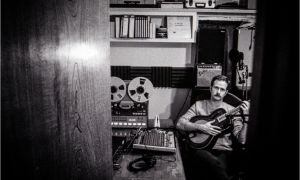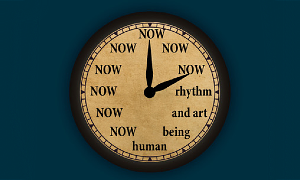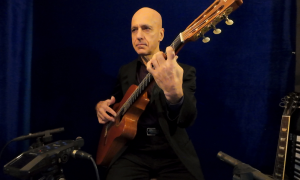Well, it doesn't get much better than this—being awarded the National Medal of Arts by the President of the United States on March 2. Of course, being named a Kennedy Center Honoree this year would certainly be icing on the cake for Sonny Rollins. The tenor saxophonist was awarded the prestigious medal along with Quincy Jones at the White House.
Sonny, 80, is one of the last performing links to the start of post-war jazz and a musician who has played and recorded with everyone who was anyone for more than 60 years. Quincy Jones, of course, remains a significant force and his recording career dates back to Lionel Hampton in 1951.
It is a joy, finally, to see legendary jazz musicians receive such an honor and to be celebrated for their enormous contribution to our culture and collective spirit.
Through music, Sonny and Jones also gave the Civil Rights movement enormous momentum. Like great black athletes of the late 1940s and early 1950s, gifted and popular black jazz artists went far to make the music race-neutral and to make whites more tolerant of differences. Without the joy of jazz on record and the radio, the struggle for racial equality would likely have been a harder sell and a longer struggle.
Congratulations to Sonny and Quincy Jones. Seeing the photo at the top of the page takes my breath away.
You weren't invited to the White House? Here's President Obama awarding the medals to this year's recipients...
Charlie Parker. If you're in New York March 10 through April 3, Cool Blues, a play written by Bill Harris about alto saxophonist Charlie Parker in 1955, is being staged at the New Federal Theater at 292 Henry Street on the Lower East Site. Tickets for performances, directed by Ed Smith, are $25. More information: 212-353-1176.
Ave Pilas, a photographer at Downbeat in the 1960s, sent along a link to his site. Lots of great candid photos of jazz legends here.
CD discovery of the week. Bassist Ark Avrutski merges jazz and samba perfectly on Sounds of Brasil. There's a steamy mood here that rises and falls like fast-changing weather. The use of flutes on Song for My Mom, for example, transfixes you. Samba in 4th, with Duduka Da Fonseca on drums and percussion, builds neatly with enormous drive. Be sure to sample S.O.B., where you'll hear a fabulous sifting of reeds, bass and surfy brushes on drums. You'll find this one here.
Oddball album cover of the week: Back before slide rules, diorama clubs and social networks, there were basement parties where teens dressed up in their parents' clothes and did weird things to white socks as they danced to LPs that older people threw away. This EmArcy album from 1955 featured den-burners like Sweet Sue, Blue Lou and Prisoner's Song. Please pass the punch.
Sonny, 80, is one of the last performing links to the start of post-war jazz and a musician who has played and recorded with everyone who was anyone for more than 60 years. Quincy Jones, of course, remains a significant force and his recording career dates back to Lionel Hampton in 1951.
It is a joy, finally, to see legendary jazz musicians receive such an honor and to be celebrated for their enormous contribution to our culture and collective spirit.
Through music, Sonny and Jones also gave the Civil Rights movement enormous momentum. Like great black athletes of the late 1940s and early 1950s, gifted and popular black jazz artists went far to make the music race-neutral and to make whites more tolerant of differences. Without the joy of jazz on record and the radio, the struggle for racial equality would likely have been a harder sell and a longer struggle.
Congratulations to Sonny and Quincy Jones. Seeing the photo at the top of the page takes my breath away.
You weren't invited to the White House? Here's President Obama awarding the medals to this year's recipients...
Charlie Parker. If you're in New York March 10 through April 3, Cool Blues, a play written by Bill Harris about alto saxophonist Charlie Parker in 1955, is being staged at the New Federal Theater at 292 Henry Street on the Lower East Site. Tickets for performances, directed by Ed Smith, are $25. More information: 212-353-1176.
Ave Pilas, a photographer at Downbeat in the 1960s, sent along a link to his site. Lots of great candid photos of jazz legends here.
CD discovery of the week. Bassist Ark Avrutski merges jazz and samba perfectly on Sounds of Brasil. There's a steamy mood here that rises and falls like fast-changing weather. The use of flutes on Song for My Mom, for example, transfixes you. Samba in 4th, with Duduka Da Fonseca on drums and percussion, builds neatly with enormous drive. Be sure to sample S.O.B., where you'll hear a fabulous sifting of reeds, bass and surfy brushes on drums. You'll find this one here.
Oddball album cover of the week: Back before slide rules, diorama clubs and social networks, there were basement parties where teens dressed up in their parents' clothes and did weird things to white socks as they danced to LPs that older people threw away. This EmArcy album from 1955 featured den-burners like Sweet Sue, Blue Lou and Prisoner's Song. Please pass the punch.
This story appears courtesy of JazzWax by Marc Myers.
Copyright © 2026. All rights reserved.



























